Thank you, Mani, for the Novel (Ivo Brešan's Letter)
Hvala Vam, Mani, na romanu (Pismo Ive Brešana)
Keywords: Mani Gotovac
More...Keywords: Mani Gotovac
More...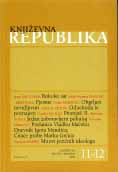
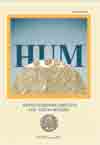
Keywords: historical novel; Croatian literature; The Bridge on the Drina; idea of historical circulus
It is necessary to start the speculations on history and its repetition in the novels of Croatian literature with Senoa and the concept of history developed in his historical novels. For Senoa, history is magistra vitae, the teacher of life, which expresses his attitude that, based on the acquired experiences, you can avoid mistakes and find better solutions. However, the genre of historical novel in Croatian literature has been constantly changing, as well as the concept of history within it and the affirmative attitude towards the past has been replaced by the vision of history as the time of evil, madness and death. Such a negative attitude towards history will be depicted in this paper through the example of novel The Bridge on the Drina (1945) by Ivo Andric.The main idea of historical circulus, i.e. recognition of the present through the past and vice versa and their permanent turns, has marked this mentioned novel.
More...Keywords: the theatrum mundi topos; Bresan's novels
The theatrum mundi topos, i.e. seeing the world as a stage, and an individual as an actor on that stage derives from Plato. The Latin metaphor of theatrum mundi, established in the Middle Ages, has constantly been enriched with new meanings. The paper deals with the use of the theatrum mundi topos in Ivo Bresan's novels, Birds of Heaven (1990) and The Confessions of a Characterless Man (1996). The protagonists of both novels see the world as a stage on which, according to their needs and when forced by their instinct for survival, they take different life roles. Bresan explicitly calls his protagonists actors, for whom the whole world is merely a stage. The theatrum mundi topos is powerfully present in both novels, ranging from understanding of the scholar John of Salisbury, through the baroque understanding of topos to the topos in symbolical works and impossibility of determining identity in permanently changing world, following Pirandello. Due to the use of meaningfully rich topos theatrum mundi, Bresan's novels become semantically more complex and require an experienced reader.
More...Keywords: multikulturalni sistem; hronotop putovanja; arhetip; mit; pripovedanje.
Pripovetka Zmija Ive Andrića jedna je u nizu tekstova u kojima pisac promišlja o sudaru multikulturalnog i multicivilizacijskog kroz doživljaj pojedinca i njegovu reakciju na dešavanja. Izabravši hronotop putovanja, Andrić na primeru individualnog iskustva svoje junakinje gradi univerzalni značenjski sistem vrednosti. Arhetipski znaci kao što su: voda, nebo ili reč, i ovoj pripovetki odaju mogućnost otkrivanja nadidejnog posebnog semantičkog polja. Kroz njih se otkrivaju duboki mitski slojevi Andrićevog pripovedanja, kao i njegov humanistički uzlet ka opšteljudskim dilemama i strahovima.
More...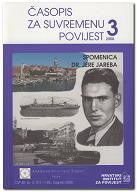
Keywords: Party of (Croatian State) Right; Austria-Hungary; Kingdom of Serbs; Croats and Slovenes; political emigration
The Frank family played a very prominent role in Croatian political history. The most imporant figure among them was Josip Frank, one of the Party of Right's leaders whose name became a synonym for political radicalism. His son, Ivo Frank, followed father's political path. Until 1918, Ivo Frank supported a solution of the Croatian question within the framework of Austria-Hungary, believing that the specific national interests of Croats and other national communities within that historical union would best be solved under the Habsburg dynasty. From the beginning he was an ardent opponent of the Yugoslav national ideology and of any connections with Serbian politicians. That view was based on an assessment that it was impossible to establish any kind of Croat-Serbian political alliance due to interwoven interersts and the aims of two very different national ideas. The dissolution of the Habsburg Monarchy gave rise to an evolution of the Party of Right's ideology. After the First World War, Ivo Frank emigrated to Budapest because the new Yugoslav government tried to eliminate him from public life by repressive measures. Despite his parliamentary immunity, he was arrested and soon lost the right to continue his law practice. During the first phase of his emigration he contacted Gabrielle D'Annunzio in Rijeka/Fiume, kept in touch with the representatives of the socalled malcontent peoples under the new Monarchy headed by Karagjorgjeviæ dynasty (Slovenes, Moslems, Kosovars, Montenegrins, and Hungarians in Vojvodina region), and participated in the formation of a paramilitary Croat legion along the Yugoslav-Hungarian border. Nevertheless, he did not succeded in organizing a strong group of Croat émigrés living in different parts of former Austria-Hungary, which might have gathered all who were not content with the situation in the Kingdom of Serbs, Croats, and Slovenes. Hence, he left the émigré leadership in the late 1920s, but he did not retire. He continued to lean on contacts with officials in the Hungarian and Italian governments. The causes of Frank's failure lay in the domination of Stjepan Radić's peasant movement of the internal political scene, international relations, internal disputes among Croat émigrés, and the appearance of a new émigré group under Ante Pavelić's authoritarian guidance. An analysis of the later period of Frank's political life could lead one to conclude that he inclined to some sort of revival of the Danubian Monarchy in order to achieve a certain degree of independence for the Croatian state and create more effective government in the zone between German and Russian influences.
More...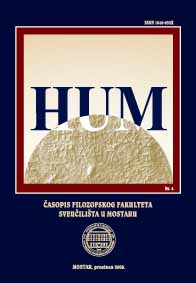
Keywords: literature; poetry; Catholic; spirit; God; hometown; homeland; emigration.
The article speaks about life and work, especially about poetry of Ivo Lendić, prominent Catholic poet, whose value is unquestionable. He appeared in 1930s as a member of the second generation of Catholic intellectuals in literature, when he published two collected poems (Lyrics 1930 and Angelus, 1936). Besides poetry, he wrote prose, critics (especially literary), essay literature; he was working as a journalist, editor and he was promoter of many initiatives and organizer of different actions. In other words, Lendić represents a real “interpreter of the spirit of his time”. After the Second World War he was in Rome, then he went to Argentina (1947), where this prominent émigré worked as an excellent journalist and editor, appearing occasionally with poems. He thought that truth, kindness and beauty were determinants of every piece of art and he wanted to show that aesthetic and ethical in his poetry.
More...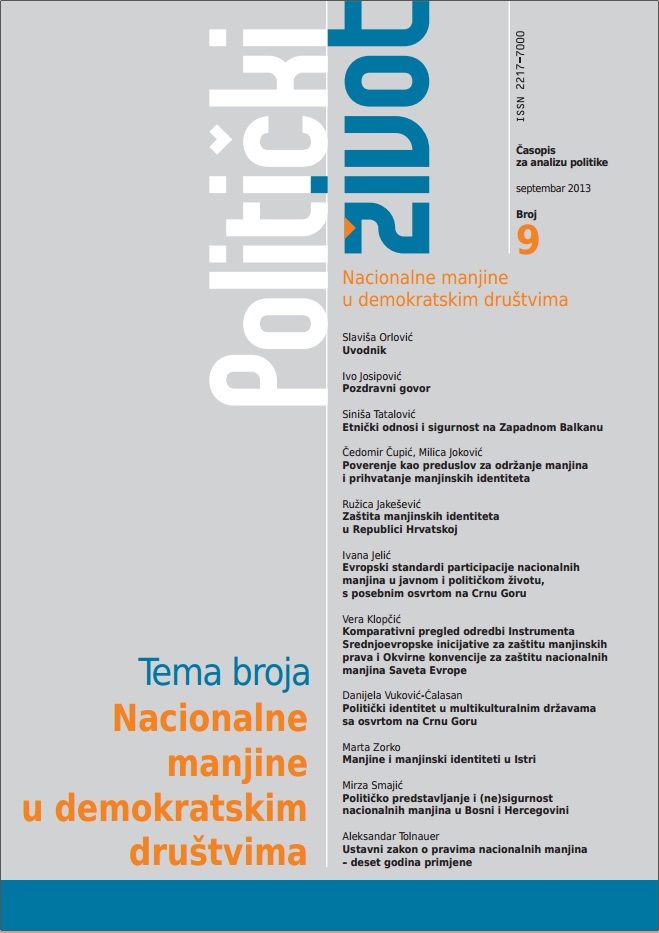
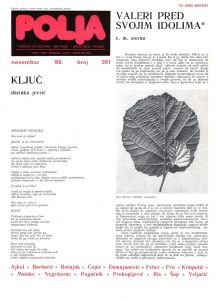
Poezija Ive Svetiiine je mietafora. Metafora jedne moći koja se neprestaino prliiziva i pokušava uvući u pisanje, pisanje koje se, uosltalom, »podrazumlijeva« — onako kao što se podrazumijeva disanije, glad, seks. Ta metafora obuhvata dva osnovna područja umjetniakog djelovanja eovjeka i zajedno s pisanjem čini, po mruogima, najvažnije kreativne atribute homo sapiensa. Kod Svetinje su to prizivanja slike (» .. Daj mi moć, sliko, da /lispišem bijieile lisfove za Botticellija/ da iznova nalrišem svijet.«) ;i glazbe (»Lijepa Botticellijeva glava sva je u bijelosti glazbe, mokra Venerina sjenia..«)/ Ove naznake se mnogostruko ponavljaju u Svetininim pjiesničkim skicama, tako da navedeno služi vllše kao podsjeitnik pri citanju, mogućnost otkrivanja modela koji se, konačno, i ne sakriijva.
More...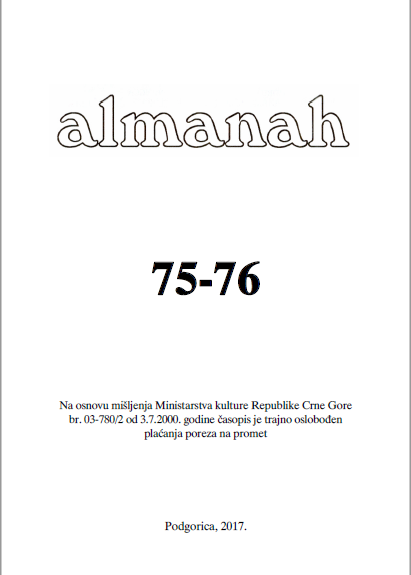
Keywords: Ivo Banac; Rusmir Mahmutćehajić; Nationalism; Politics; Bosnian literature;
Ivo Banac's interview with Rusmir Mahmutćehajić
More...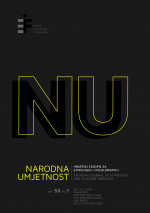
Keywords: food; banquet; language of drama; conceptual metaphor; cognitive semantics;
This paper investigates the contrast of eating and speaking from the theoretical standpoint of cognitive semantics, as it appears in plays written by Ivo Brešan. These examples are mediated by literary archetypes and conventional expressions based on the ideas are food and the mind is a container conceptual metaphors. They are also a specific way to problematize language in new folk plays. Starting from the classical cognitive view (Lakoff and Johnson 1999), and Deleuze’s (2015) dialectics of eating and speaking as a relationship between the inner and the outer, the paper articulates the duality of the cultural model of banquet: manifestations of the exchange of ideas, consciousness and spirituality, and manifestations of hedonism, inner, unconsciousness and physical. This duality in Brešan’s plays has a specific social-critical form.
More...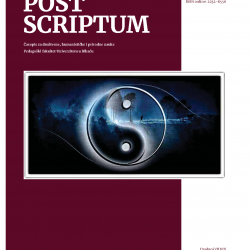
Keywords: hybrid identity; the space between; the opposition East-West; a political novel; stereotypical cultural representations;
By placing Ivo Andric in the context of Western European tradition of Orientalism, the paper discusses the deconstruction of the cultural-identity stereotypes in the novel “The Damned Yard”. With the aim of showing that the stereotypical cultural divides are one of the mechanisms of political action by which he, through the attempt of monopolization of culture and construction of an eligible collective identity which van (and must) be accomplished as vassal, seeks to establish and/or maintain the absolute power, the paper, starting from questioning postcolonial opposition East-West in Andric‘s “Devil‘s yard”, is considering the hybrid identity of the protagonists of the novel and their confrontation with the repressive measures of the totalitarian regime as factors of degradation orientalist discourse and deconstruction of cultural-identity stereotypes. The paper leads to the conclusion that in the process of identity hybridization of Camil and Fra Peter and the proces of articulation of the identity, moral and existential drama of a man exposed to repressive measures of the totalitarian political system, all the difference between the characters, including those which are arising from cultural and civilizational division into East and West, are deleted and relativized.
More...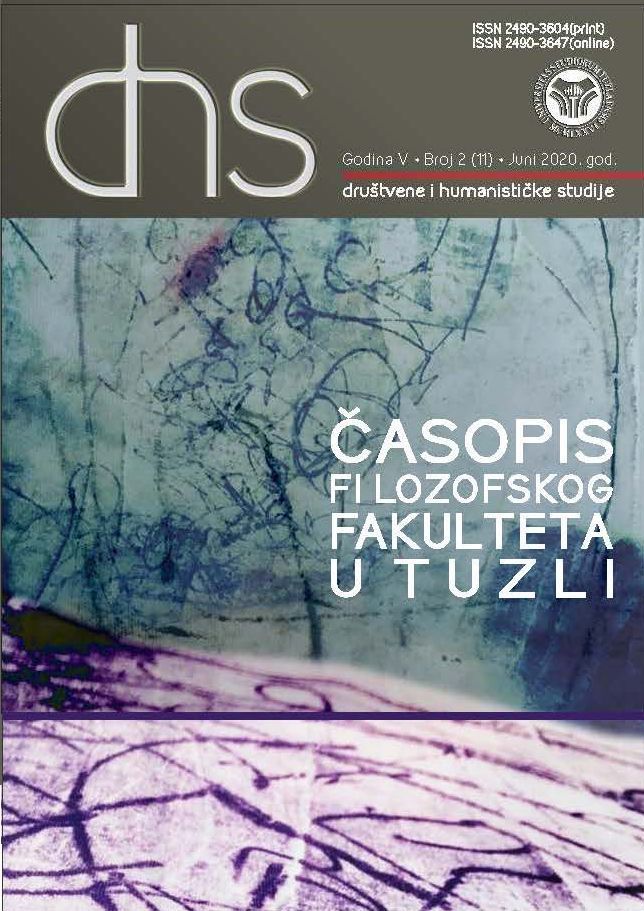
Keywords: Ivo Andrić; Branko Ćopić; novel; cryopoetica;
The paper analyzed the novel The Deaf Gunpowder (1957) and the story Winter (1940) by Branko Ćopić, and the novel The Bridge on the Drina (1945) and the story Vejavica (1968) by Ivo Andrić. Thepresence of real coldness within Andrić and Ćopić’s cryopoetics was comparatively researched similarities and differences in the authors’ narrative techniques were observed, with the reference to the presence of real winter at the places of narrative importance or in strong text positions (titles, beginnings and endings). Also, the presence of imaginary coldness was analyzed in the processes of characterization,the characters’ emotions, their attitudes, gestures and somatic coldness, with special reference to psychological coldness and its manifestations. The places of narrative importance in The Deaf Gunpowder are consistently tied to coldness, or to its decrease, while in The Bridge on the Drina, all key episodes (and the most artistic ones) are cryopoetically marked. When it comes to the stories, it is noted that in Ćopić’s story through the lyricism of the landscape, one girl’s emotions are projected into the natural environment, while in the story by Ivo Andrić, the historical-political situation of Dubrovnik’s relationship with Bosnia is told through a complex metaphorization.
More...
Keywords: political novel; cryopoetics; winter in literature; Ivo Andrić; The Damned Yard;
This paper will examine the importance and characteristics of the poetics of cold/coldness in Ivo Andrich’s novel The Damned Yard (1957), and it will do so in the context of its political novel genre characteristics. Criticisms of societies, regimes, and ideologies emerged in its novelistic form in the late nineteenth and early twentieth centuries, literary-critical studies devoted to this phenomenon emerged in the second decade of the twentieth century, and the genre flourished on the world literary scene in the years after World War II which is when The Damned Yard was first published. In addition to the features of a political novel, such as a criticism of a social system, in this novel we find a significant presence of the tropes of winter, or coldness, which contributes to its overall stylistic and genre markedness. In the paper, we will analyze how Andrich portrays winter and cold throughout the novel, from the opening to the final paragraph, both literally and in figurative semantic transmissions, as signs of difficulties, despair, worries, old age and death. The novel begins and ends with winter and snow, but cryopoetics is present in the characterization of the characters, their interaction, the description of the outer and inner spaces, as well as the narrative techniques, which we will show in this paper.
More...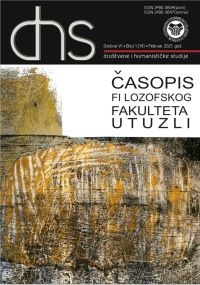
Keywords: Ivo Andrić; The Damn Yard; cryopoetics; strong position of the text; incoative and final sentence;
The paper analyzes some of the cryopoetic elements in Ivo Andrić ‘s novel The Damn Yard from a stylistic aspect. Special attention is paid to the strong positions of the text, ie. analysis of titles, incoative and finite sentences, names of characters, as well as other interesting elements.
More...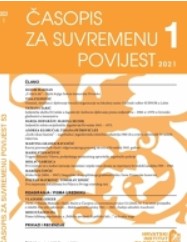
Keywords: World War I; Croatian politics; Austria-Hungary; South Slavic Question; sub-dualism; quadrialism;
During World War I, Ivo Pilar, a famous Croatian politician from Bosnia and Herzegovina, produced and presented numerous political documents. His basic views on the national question are known from pre-war times. In the harsher wartime conditions, they became an example of advocating the resolution of the position of Croatia exclusively within the frame of the Habsburg Monarchy. This text analyses two newly-discovered documents that confirm Pilar’s political activities and his expectation that Austria-Hungary would survive the war, while its leadership would come to understand the need to change the dualistic structure of the state in order to secure its survival and future. Analysis shows that his proposals reached the important factors of Austrian politics, which confirms their relevance. The new documents show Pilar’s intent that they should be used to promote proposals on sub-dualism and quadrialism in favour of Croatian national interests as he imagined them in the context of the wartime turmoil.
More...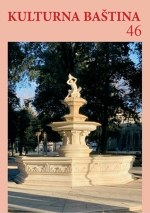
Keywords: Ivo Vojnović; Ante Tresić Pavičić; The Vojnović Family; correspondence; 20th century;
The Vojnović family originated in Popovo Polje in Herzegovina. According to some historical sources, Prince Jovan Vujov Vojnović moved to Herceg Novi in around 1690, which was then under the Venetian rule. In the 1770s, Venice recognized the families of noble origin, as well as their coats of arms, and awarded them the title of prince. It was due to this exact recognition, which was also confirmed by Austria, that the family members used the title of the Užice Princes, since the city of Užice was in the possession of the Vojnović family. The Vojnovićs were prominent naval officers, lawyers, politicians and writers. At the turn of the 19th and 20th centuries, a significant mark in the political and cultural sphere was made by Konstantin Vojnović and his two sons, Ivo and Lujo. Ivo Vojnović was born in Dubrovnik on October 9, 1856. He attended the classical grammar school in Split and Zagreb, where he graduated in 1875, and then received his doctorate in law in 1879. In the period from 1883 to September 1903, he worked as a bailiff at the District Court in Križevci, then he was the court reporter at the Governorship in Zadar. He also served as a commissary at the Dubrovnik District Authority, an administrator at the Supetar District Authority and, finally, a secretary at the Zadar Governorship. In the period October 1903 – spring 1907, he once again held the position of a district administrator, but due to an accounting scandal, he was dismissed from the civil service without the right to a pension. In the same year, on June 13, he was appointed playwright of the Croatian National Theatre in Zagreb. In 1911, as he failed to renew his contract with Vladimir Treščec-Branjski, who was a theatre manager then, I. Vojnović decided to become a professional writer. The sudden death of his sister Katica in 1928 caused him severe emotional distress. As he had been seriously ill prior to her death, he decided to spend a certain amount of time at Zagreb sanatorium. Since the prospects of his recovery were rather slim, he accepted the invitation of the noble family Gavrilović Glučić to be a guest in their villa on the Topčidar Hill. He was soon admitted for the treatment at the sanatorium of Dr Zivković in 57 Krunska Street in Belgrade. He died there on August 30, 1929. He appeared in literature as early as 1880, when August Šenoa, then editor of Vijenac, published his short story Geranium. This was followed by the publication of a short story and a novel – Perom i olovkom and Ksanta. His debut play Psyche in 1889 marked a turning point in both the Croatian theatre and literature and provided him with the attribute of the pioneer of modern drama who managed to introduce Croatian dramaturgy into then current trends of the European drama production. In the personal archives of Ante Tresić Pavičić (Vrbanj on Hvar 1869 - Split 1949), which is kept in the State Archives in Split, there is correspondence containing a total of 937 letters; there are 6 postcards, 2 business cards, 1 telegram and 22 letters by Ivo Vojnović covering the period from 1907 to 1912. The letters had a private character, although some were written on the headed notepaper that belonged to the management of the Croatian theatre in Zagreb. In those letters, Vojnović presented and described various events and in connection with them his thoughts, feelings and hopes. He often inserted proverbs in Italian, French and German. In the letters, Vojnović addressed Ante Tresić Pavičić with: dear doctor, dear Tresić, dear friend, my dear friend. He ended them in the following manner: with the most cordial greetings, trust your loyal friend, greetings from yours, from the bottom of my heart, your loyal friend, may God follow you on your path, hugging you I remain yours, etc. According to their content, the letters are divided into five categories: 1 District administrator in Supetar (1907) 2 Playwright at the Croatian National Theatre in Zagreb and dismissal (1908 / 1910; specified year n/a) 3 Playwright at the Croatian National Theatre in Zagreb (1908 /1910) 4 Dismissal from the civil service (1908 / 1910; specified date and year n/a) 5 Professional writer (1912) Although there is a large number of critical reviews of Ivo Vojnović’s literary work, little is known of his emotional state and life that ensued when he, at the age of fifty-two and after twenty-five years of respectable literary career, was dismissed without the right to a pension, due to an accounting scandal. Therefore, the letters to Ante Tresić Pavičić, who was a representative at the Imperial Council and the only true friend, represent an invaluable source of information about both Ivo Vojnović and the environment in which this acclaimed artist lived and worked.
More...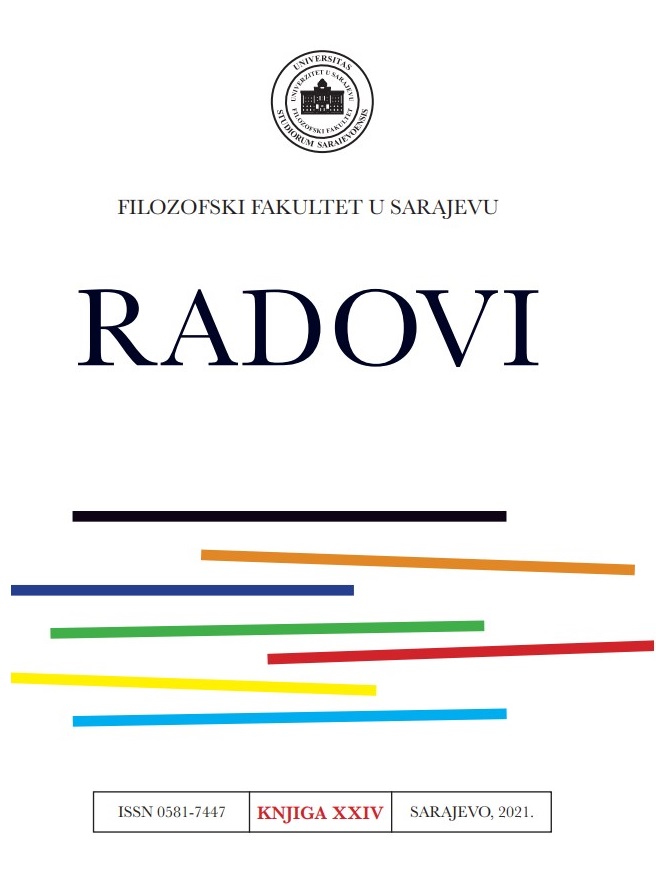
Keywords: Andrić; Chekhov; character; fiancées; freedom; heroine mode; Fata Avdagina;
The comparative work The Character of the Bride by I. Andrić and A. P. Chekhov: Exceptional and Free compares two female characters of engaged / promised girls: Andrić’s Fata Avdagina from the novel The Bridge on the Drina and Chekhov’s Nadia from the novel The Fiancée. The paper examines the mode of heroines and their way of deciding when giving up a marriage that none of the heroines want. Referring to the text, the paper examines the exceptionality of Fata Avdagina in the context of the spatial and temporal specificity of the character, as it also examines the issue of freedom and decision to leave the space and the potential conventional marriage of Chekhov’s Nadia. Through the literary analysis of the character, the paper draws conclusions that determine the modal affiliation of the heroines and opens the question of the freedom of female characters with an emphasis on a specific situation where within the historical context a more modern female character emerged in an earlier time period, which in turn raises the question of different literary contexts in different literary communities and spaces of literary creation. With this clue, the most representative female character of the Chekhov’s bride and the most exceptional character of the only bride who does not agree to the marriage of Andrić were chosen for this work. The paper examines the extent to which Nadia’s individualization, ie Fata’s socialization, determines the further course of the action and their completion, as well as calls into question the relationship of individuals to society and the relationship of society to individuals. Also, the work raises the question of why an exceptional being in the world of the small town of Andrić’s novel must be destined for tragedy, while Chekhov’s female character is given the possibility of freedom the moment he becomes a character of activity.
More...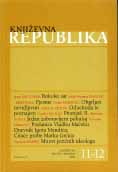
Keywords: Ivo Andrić; stories; Bosnian literature; Croatian literature; Serbian literature;
Svugdašnji?! Pridjev je to tvorbeno nalik pridjevu svagdašnji, a koji, izveden od priloga svagda, znači: ono što biva u svako doba, uvijek, vazda; no, priloga svugda nema »ni od korova« da bi značio: na svakome mjestu, svagdje, posvud(a) — što je, značenjski, u jeziku zauzeto za prilog svud(a). Međutim, nije Andrič u svom pripovjedačkom zanatu/obrtu tek običan majstor, »dunđer« (= irano-turski: drvodjelja, tesar, zidar); on je »neimar« (=arabo-turski: vrhunski graditelj) europeizmom rečeno: arhitekt je on riječima, i to ne tek izoliranima, pojedinačnim, već osobito njihovim ulančavanjem u priču / pričanje.
More...